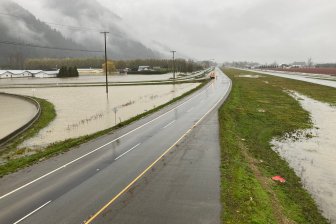As countries race to stem the spread of the COVID-19 Omicron variant, questions are swirling over whether Canada’s rollout of vaccine boosters should be sped up to safeguard against its impending spread.
The new variant, declared Friday by the World Health Organization as the novel coronavirus’s fifth variant of concern, prompted panic among nations, including Canada, pushing them to close borders to a wide swathe of southern African countries.
South African scientists first identified the variant earlier this week after a sudden, exponential rise in cases in the country. Public health experts were alarmed by the variant’s high number of mutations, with preliminary data revealing an increased potential for transmissibility and reduced response to the effects of vaccines.
Other experts, though, were quick to point out South Africa’s low rates of vaccination — sitting under 30 per cent of its total population — as well as a lack of evidence showing the variant as being any deadlier than the current dominant variants of COVID-19.
And while there is no definitive evidence yet of the variant’s ability to circumvent the protection offered by vaccines, public health experts were quick to reassure Canadians that getting vaccinated was still the best way of preventing the disease’s most severe outcomes.
On whether there was now an urgency for Canadians to get their booster shot sooner, experts were still undecided.
In response to a question on whether the general population should get their third dose sooner, Canada’s chief public health officer Dr. Theresa Tam told reporters at a press conference Friday that she doesn’t know yet if the emergence of the variant changes the country’s trajectory on boosters.
She pointed, however, to the vast majority of fully inoculated Canadians having received their last dose in the last five to six months or so, saying they were nearing the eligible period for a booster.

On whether Canada’s booster strategy would change in the coming days, Tam said it would continue to be “examined actively.”
Several vaccine makers have already announced that they were examining ways to further enhance or change their drugs to target the rapidly spreading variant.
AstraZeneca said it would be looking at the variant’s impact on its vaccine and antibody cocktail and Pfizer-BioNTech said they expect to be able to produce a new vaccine tailored to match the Omicron.
Moderna, on the other hand, said it was working on a booster candidate suited to counter the new variant, while Novavax said it had already started to work on its version of a vaccine against it.
Speaking with Global News on Friday, infectious diseases physician Dr. Zain Chagla warned that a rush spurred by the variant’s arrival could have a negative effect on the fight against COVID-19.
“Until we get better data, the rush to go out and get vaccinated may, unfortunately, do the complete opposite — increase demand, increase imports of vaccines, and lead to more escalation of vaccine inequity which leads to more variants, which leads to this never-ending cycle,” said Chagla.
“Similarly, we have to be very cognizant of the fact that our vaccine intake in this country has direct effects on the world. We have to use evidence to say who needs to get it and who doesn’t instead of an internal belief that we need to do more.”

Canada’s vaccination rates stand among some of the highest in the world, with nearly 80 per cent of the country’s total eligible population being fully vaccinated against COVID-19.
While the new Omicron variant has not yet been detected in Canada, public health experts have said they would not be surprised if the virus was likely “already here” and spreading within the country’s borders.
The federal government announced new travel restrictions against several southern African countries Friday alongside a handful of other countries, including Israel and European Union member states.
Britain, Germany and Italy were the latest countries to detect new cases of the variant Saturday. Omicron has already been found in Belgium, Botswana, Israel and Hong Kong since its discovery in South Africa.
Dutch officials said they detected 61 new cases of COVID-19 flying into Amsterdam from two flights from South Africa, though they were yet to announce whether any of those cases included the new variant.
“I would not be surprised if many countries, over the next days, now that we’ve been alerted, might go back and try and find out if the virus had already arrived,” said Tam.
The public health chief warned Canadians to maintain caution and keep their layers of protection as they head into the holidays and winter months with many families beginning to congregate indoors and in more social settings.
“I think over the next months until, we get out of the winter, into the spring period and we know more about variants such as this, the degree of precaution is important.”
— with files from The Canadian Press and Reuters
© 2021 Global News, a division of Corus Entertainment Inc.









More Stories
Improve balance and build core strength with this exercise
‘Sciatica was gone’: hospital performs robot-assisted spinal surgery in Canadian first | Globalnews.ca
Makeshift slaughterhouse in a residential garage points to growing concerns about illicit meat sales | CBC News